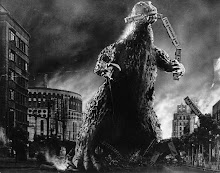
Man on Wire (2008)
[http://www.imdb.com/title/tt1155592/]
The Gist:
Man on Wire is a documentary that speaks to a sort of simple poetry, whereby walking on a wire hundreds of feet in the air is exalted as a spiritual experience, as a overwhelming purpose in the life of our protagonist. Immediately, then, we have one of the key components for an excellent documentary, a subject of innate interest. However, I also enjoy how the entire film works as a sort of slow build to the event, taking the audience pace by pace through the preparation and anxious moments until finally we arrive at dawn to this crazy French fucker doing tricks on the rope held taut between the two now nonexistant trade towers, avoiding the police and even mocking them, staying up on the rope for forty five minutes before finally coming down as the wind starts to pick up. This documentary technique was done with a greater pace and a stronger affect in The Cove (which unraveled like a heist film), but what Man on Wire lacks in suspense it makes up for with whimsical spirit.














